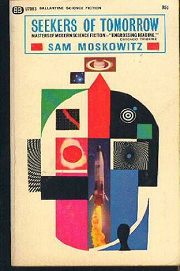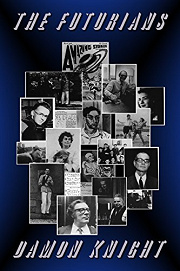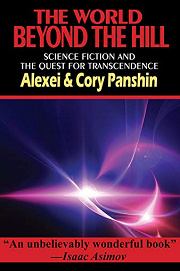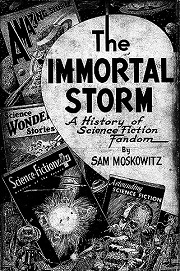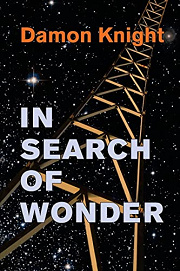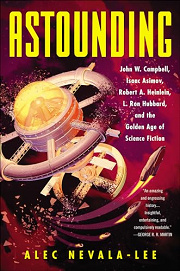Share your thoughts in a quick Shelf Talk!
Seekers of Tomorrow: Masters of Modern Science Fiction by Sam Moskowitz
Meet the architects of modern imagination—from magazine upstarts to genre-defining icons. Seekers of Tomorrow: Masters of Modern Science Fiction shines a fan’s spotlight on the writers who built SF’s golden age, charting the passions and persistence behind their groundbreaking tales.
Have you read this book? Share what you liked (or didn’t), and we’ll use your answers to recommend your next favorite read!
Love Seekers of Tomorrow: Masters of Modern Science Fiction but not sure what to read next?
These picks are popular with readers who enjoyed this book. Complete a quick Shelf Talk to get recommendations made just for you! Warning: possible spoilers for Seekers of Tomorrow: Masters of Modern Science Fiction below.
In Seekers of Tomorrow: Masters of Modern Science Fiction, did you enjoy ...
... the broad, personality-rich mosaic of Golden Age figures—Campbell, Asimov, Heinlein, Sturgeon—painted through vivid biographical sketches?
The Futurians by Damon Knight
If you loved how Seekers of Tomorrow jumps from John W. Campbell’s editorial machinations to Isaac Asimov’s breakthrough with “Nightfall,” from Robert Heinlein’s Navy-forged discipline to Theodore Sturgeon’s struggles before pieces like “Microcosmic God,” you’ll relish Knight’s insider portraits. The Futurians drops you right into the same circle—Asimov, Frederik Pohl, C. M. Kornbluth, Judith Merril—showing how the personalities you met in Moskowitz’s profiles collided and collaborated in shabby apartments and magazine offices to reshape the field.
... the sweeping, decades-spanning history of SF from pulp roots to the Campbell era that framed so many of Moskowitz’s profiles?
The World Beyond the Hill by Alexei Panshin and Cory Panshin
Moskowitz traces careers across years—Campbell steering Astounding, Asimov refining story ideas at the editor’s desk, van Vogt assembling fix-ups like Slan, and C. L. Moore and Henry Kuttner’s collaborative surge. The World Beyond the Hill widens that lens, mapping the philosophical and cultural currents beneath those same milestones so you can see how the field grew from the pulps to the Golden Age that your favorite chapters in Seekers of Tomorrow keep returning to.
... the behind-the-scenes feuds, editorial power plays, and fandom battles orbiting Campbell and the magazines?
The Immortal Storm: A History of Science Fiction Fandom by Sam Moskowitz
If the editorial and fandom scuffles peeking through Seekers of Tomorrow—Campbell’s iron editorial hand over Astounding, the jockeying that affected Asimov’s earliest sales, the magazine turf wars that shaped Heinlein’s outlets—caught your eye, The Immortal Storm is Moskowitz’s full dive. You’ll get the 1939 Worldcon clashes, factional infighting among the Futurians, and the machinations that explain why those author trajectories in Seekers zigged when you expected them to zag.
... the crisp, essay-by-essay format that delivers concentrated anecdotes—like Asimov’s Campbell-inspired “Nightfall” spark or van Vogt’s nocturnal drafting—without a single continuous narrative?
In Search of Wonder by Damon Knight
Part of Seekers of Tomorrow’s charm is how each chapter functions like a stand-alone profile—Heinlein’s ‘Future History’ method here, Sturgeon’s reinvention there—letting you dip in for a sharp hit of context and lore. Knight’s classic collection offers that same bite-sized richness: incisive essays and reviews that unpack the craft and reputations of many of the writers you just read about, with the same quick stride from story facts to big takeaways.
... the analytical, behind-the-curtain look at how Campbell’s guidance shaped Asimov’s breakthroughs and redirected Heinlein’s trajectory?
Astounding: John W. Campbell, Isaac Asimov, Robert A. Heinlein, L. Ron Hubbard, and the Golden Age of Science Fiction by Alec Nevala-Lee
Moskowitz shows you Campbell nudging ideas like “Nightfall” into place and shaping magazine identity while authors like Heinlein recalibrated to meet that vision. Nevala-Lee drills into those very relationships with new detail—Campbell’s editorial theories in practice, Asimov’s early dependence on that office door, and the ripple effects on contemporaries from van Vogt to Hubbard—giving you the deeper mechanics behind the anecdotes you enjoyed in Seekers of Tomorrow.
Unlock your personalized book recommendations! Just take a quick Shelf Talk for Seekers of Tomorrow: Masters of Modern Science Fiction by Sam Moskowitz. It’s only a few questions and takes less than a minute.
